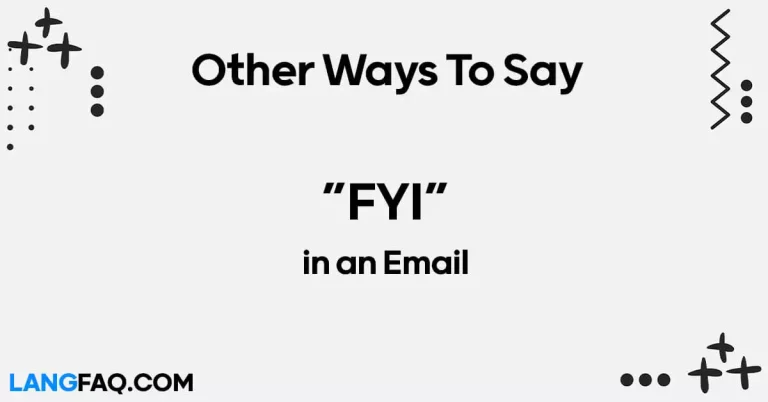In a world brimming with opportunities, effective communication is key. Saying “Will Do” is commonplace, but why limit yourself to the ordinary? This comprehensive guide unfolds 12 alternative expressions to enhance your verbal commitments. Embrace the power of words, and let’s dive into the art of expressing readiness with flair.
12 Other Ways to Say “Will Do”
Here are 12 alternative ways to express “Will Do”:
- I’ll take care of it.
- Consider it handled.
- It’s on my to-do list.
- Leave it with me.
- I’ve got this covered.
- You can count on me.
- I’ll make it happen.
- I’m on it.
- I’ll get right on that.
- It’s in my queue.
- I’ll see to it.
- You can rely on me for that.
| Expression | Meaning | Example |
|---|---|---|
| I’ll take care of it. | I will handle the task or responsibility. | “Don’t worry about the report; I’ll take care of it.” |
| Consider it handled. | The task is already taken care of. | “Thanks for assigning the project; consider it handled.” |
| It’s on my to-do list. | The task is planned for completion. | “Adding it to my to-do list; it’ll be done by tomorrow.” |
| Leave it with me. | Entrust the task to me; I’ll handle it. | “Leave the logistics to me; I’ll handle it smoothly.” |
| I’ve got this covered. | I have the situation under control. | “Facing challenges? No worries; I’ve got this covered.” |
| You can count on me. | Depend on me; I will fulfill the commitment. | “You can count on me to deliver the results on time.” |
| I’ll make it happen. | I will ensure the task gets done. | “Need a solution? Trust me; I’ll make it happen.” |
| I’m on it. | I am actively working on the task. | “Concerned about the issue? Rest assured, I’m on it.” |
| I’ll get right on that. | I will start working on it immediately. | “Received your request; I’ll get right on that task.” |
| It’s in my queue. | The task is in line for completion. | “Noted your request; it’s in my queue for today.” |
| I’ll see to it. | I will ensure the task is completed. | “Any concerns? Leave it to me; I’ll see to it promptly.” |
| You can rely on me for that. | Trust me to fulfill this commitment. | “Need someone reliable? You can rely on me for that task.” |
These alternative expressions provide a diverse range of ways to convey a commitment to completing tasks or responsibilities. Whether in a professional or personal context, using varied phrases adds depth to your communication and enhances your ability to express dedication effectively.
Is It Correct to Say “Will Do”?
Absolutely! “Will do” is a commonly used and perfectly correct phrase in English. It is an informal way of expressing agreement, acceptance, or a willingness to carry out a task or fulfill a request. This versatile expression is often used in both professional and casual settings to confirm that you understand and are prepared to proceed with what has been asked or suggested.
Usage Examples:
- Professional Setting:
- Colleague 1: “Could you review this report and provide feedback by the end of the day?”
- Colleague 2: “Sure, will do!”
- Casual Setting:
- Friend 1: “Can you pick up some groceries on your way home?”
- Friend 2: “No problem, will do!”
- Formal Setting:
- Email Request: “Please send the updated project proposal by tomorrow.”
- Response: “Certainly, will do.”
Using “will do” in response to a request or instruction is concise, polite, and widely understood. It conveys a positive and cooperative attitude, making it a convenient and effective way to confirm your commitment to a task or agreement.
Professional Mail Example With “Will Do”
Subject: Project Update and Next Steps
Dear [Recipient’s Name],
I trust this email finds you well. I wanted to provide a brief update on the ongoing project and discuss the next steps.
Firstly, I want to express my gratitude for your valuable input during our recent team meeting. Your insights have been instrumental in shaping the direction of the project. Based on our discussions, I have outlined the key action items that need immediate attention.
- Reviewing Client Feedback:
- Your task is to review the latest client feedback and incorporate relevant suggestions into the upcoming client presentation. The deadline for this task is [insert deadline].
- Coordinating with Design Team:
- We are in the final stages of the design phase. Please coordinate with the design team to ensure that all elements align with the client’s expectations. Your deadline for this coordination is [insert deadline].
- Preparing for Stakeholder Meeting:
- As we approach the stakeholder meeting scheduled for [insert date], your role will be to compile the necessary documentation and prepare a concise presentation summarizing our progress and future plans.
Your expertise in these areas is crucial to the success of the project, and I am confident that your contributions will significantly impact our client’s satisfaction.
Kindly acknowledge receipt of this email, and if you have any questions or need further clarification, feel free to reach out. Your dedication to meeting these deadlines is highly appreciated, and I’m certain that with your involvement, we will achieve outstanding results.
Thank you once again for your commitment to excellence. Will do let me know if there are any challenges or unforeseen obstacles in meeting the outlined deadlines.
Best regards,
[Your Full Name] [Your Position] [Your Contact Information]
I’ll Take Care of It
In the realm of commitments and responsibilities, the phrase “I’ll take care of it” stands as a beacon of reliability and assurance. This expression conveys a sense of responsibility and capability, making it a versatile choice in various scenarios.
When to Use:
- Formal Context: In professional settings, using “I’ll take care of it” adds a layer of professionalism to your commitment. It’s suitable for tasks that demand a serious and responsible approach.Example: “Concerned about the upcoming presentation? No worries, I’ll take care of it. You can focus on other aspects.”
- Informal Context: Among friends or in casual conversations, this phrase can be used to express your willingness to handle a situation or assist someone.Example: “Planning the surprise party? Awesome! I’ll take care of the decorations, and you handle the guest list.”
Variations:
- For Colleagues: “I’ve got this covered for the team; don’t worry.”
- For Friends: “Leave the weekend plans to me; I’ll take care of the details.”
- For Mentor-Mentee: “In your absence, I’ll take care of managing the project.”
Grammar/Usage Tips:
- Use this phrase when you are confident and capable of handling the task.
- It’s a commitment that signifies personal responsibility.
Pros and Cons:
- Pros: Demonstrates reliability, assures others, and adds a touch of professionalism.
- Cons: May sound formal in very casual situations; ensure it matches the context.
Insights from Cambridge Dictionary:
- According to Cambridge Dictionary, the phrase “take care of” means to deal with a person or task.
Email Sample:
Subject: Taking Charge of the Project
Hi [Recipient],
I hope this email finds you well. I wanted to assure you that the project is in good hands. I’ll take care of it and ensure a smooth execution. If you have any specific preferences or concerns, feel free to let me know.
Best regards, [Your Name]
Consider It Handled
Expressing confidence and a proactive approach, “Consider it handled” is a powerful way to convey that the task is not only acknowledged but already in capable hands.
When to Use:
- Formal Context: Use this phrase in professional settings to reassure stakeholders or team members that their concerns or tasks are being effectively managed.Example: “Received the client’s feedback, and I’ve already taken corrective measures. Consider it handled.”
- Informal Context: Among friends or in casual situations, this phrase can be employed to assure someone that their request or favor is being attended to.Example: “Need a ride to the airport? No problem. Consider it handled; I’ll be there to pick you up.”
Variations:
- For Colleagues: “Consider it sorted; I’ve initiated the necessary steps.”
- For Friends: “Your birthday plans? Leave it to me; consider it sorted.”
- For Mentor-Mentee: “Concerned about the upcoming presentation? I understand; consider it handled.”
Grammar/Usage Tips:
- Use this phrase when you want to convey a proactive and efficient approach to handling a situation.
- Ensure that the task is indeed under control before using this expression.
Pros and Cons:
- Pros: Projects confidence, assures prompt action, and instills trust.
- Cons: May sound too assertive in situations where a more empathetic tone is needed.
Insights from Cambridge Dictionary:
- According to Cambridge Dictionary, “consider” means to think about something carefully, especially before making a choice or decision.
Email Sample:
Subject: Resolving the Issue – Consider It Handled
Hi [Recipient],
I wanted to update you on the issue you raised earlier. I’ve already looked into it, and necessary steps have been taken to address the concern. Consider it handled. If you have any further questions, feel free to reach out.
Best regards, [Your Name]
It’s on My To-Do List
Adding a touch of organization and planning, “It’s on my to-do list” communicates that the task is acknowledged and scheduled for completion. This phrase is effective when you want to assure others that their request is not forgotten and will be addressed.
When to Use:
- Formal Context: In professional settings, using this phrase indicates that you are managing tasks systematically, providing a sense of structure and reliability.Example: “Thank you for the project brief; it’s on my to-do list for this week. You can expect updates by Friday.”
- Informal Context: Among friends or in casual discussions, this phrase can be employed to let someone know that you’ve noted their request and will handle it.Example: “Planning a movie night? Awesome! It’s on my to-do list to check the latest releases and pick a great film.”
Variations:
- For Colleagues: “I’ve included it in my task list for this month; it will be addressed.”
- For Friends: “Your party invitation? Noted! It’s on my to-do list to RSVP and get a gift.”
- For Mentor-Mentee: “Concerned about your progress? Don’t worry; it’s on my to-do list to discuss it with you.”
Grammar/Usage Tips:
- Use this phrase when you want to convey a sense of organization and planning.
- Ensure that the task is genuinely on your agenda and will be addressed.
Pros and Cons:
- Pros: Demonstrates systematic task management, assures others of your commitment.
- Cons: May sound overly formal in very casual situations; use with discretion.
Insights from Cambridge Dictionary:
- Cambridge Dictionary defines a to-do list as “a list of tasks that you have to do.”
Email Sample:
Subject: Acknowledging Your Request – It’s on My To-Do List
Hi [Recipient],
I appreciate your prompt response. I want to assure you that your request has been noted and is on my to-do list. I will prioritize it and provide updates as soon as possible. If you have any specific preferences, feel free to let me know.
Best regards, [Your Name]
Leave It with Me
Conveying a sense of trust and assurance, “Leave it with me” is a phrase that implies you are taking responsibility for the task at hand. It’s a commitment that goes beyond acknowledgment, assuring others that they can rely on you.
When to Use:
- Formal Context: In professional scenarios, using this phrase communicates a strong commitment to handling a task or project efficiently.Example: “Concerned about the client meeting preparations? Leave it with me; I’ll ensure everything is in order.”
- Informal Context: Among friends or in casual discussions, this phrase can be used to assure someone that their concern or request is in capable hands.Example: “Need help with your move? Leave it with me; I’ll organize the logistics and make it seamless.”
Variations:
- For Colleagues: “Leave the project details with me; I’ll coordinate with the team.”
- For Friends: “Your dinner plans? Leave it with me; I’ll find a great place and make reservations.”
- For Mentor-Mentee: “Struggling with the task? Leave it with me; I’ll guide you through the process.”
Grammar/Usage Tips:
- Use this phrase when you want to convey a strong commitment and assure others that the task is in capable hands.
- Ensure that you are genuinely capable of handling the responsibility.
Pros and Cons:
- Pros: Builds trust, assures others, and demonstrates a proactive approach.
- Cons: May sound overly confident in situations where a more collaborative tone is needed.
Insights from Cambridge Dictionary:
- According to Cambridge Dictionary, “leave it with someone” means to trust someone to deal with something.
Email Sample:
Subject: Taking Charge – Leave It with Me
Hi [Recipient],
I understand the importance of the upcoming event, and I want to assure you that you can leave it with me. I’ll handle the logistics, coordination, and ensure a successful outcome. If you have any specific preferences or requirements, feel free to share them.
Best regards, [Your Name]
I’ve Got This Covered
Exuding confidence and a sense of competence, the phrase “I’ve got this covered” is a powerful assertion of personal responsibility. It communicates not only willingness but also a belief in one’s capability to handle the task effectively.
When to Use:
- Formal Context: In professional settings, using this phrase signifies that you are not just committed to the task but confident in your ability to deliver results.Example: “Concerned about the project deadline? Don’t be; I’ve got this covered. Expect timely completion and quality work.”
- Informal Context: Among friends or in casual scenarios, this phrase can be used to assure someone that their concern or request is well within your capabilities.Example: “Worried about the surprise party? Relax; I’ve got this covered. It will be a memorable event.”
Variations:
- For Colleagues: “Rest assured, team; I’ve got this covered. We’ll meet our targets.”
- For Friends: “Your travel plans? No need to stress; I’ve got this covered. I’ll find the best deals.”
- For Mentor-Mentee: “Struggling with the assignment? I understand; I’ve got this covered. Let’s work through it together.”
Grammar/Usage Tips:
- Use this phrase when you want to convey both commitment and confidence in handling the task.
- Ensure that you genuinely believe in your ability to handle the responsibility.
Pros and Cons:
- Pros: Instills confidence, assures others, and communicates a proactive and capable approach.
- Cons: May sound overly confident in situations that require a more collaborative tone.
Insights from Cambridge Dictionary:
- According to Cambridge Dictionary, “have something covered” means to have arranged everything that is necessary.
Email Sample:
Subject: Project Update – I’ve Got This Covered
Hi [Recipient],
I wanted to provide a quick update on the ongoing project. Rest assured, I’ve got this covered. Timelines are on track, and we are making substantial progress. If you have any specific inputs or queries, feel free to share them.
Best regards, [Your Name]
You Can Count on Me
Assuring others of your reliability and commitment, “You can count on me” is a phrase that goes beyond a simple acknowledgment. It signifies that you are dependable and trustworthy in fulfilling your promises.
When to Use:
- Formal Context: In professional settings, using this phrase communicates a high level of reliability, crucial for team collaboration and project success.Example: “Need support with the client presentation? You can count on me to deliver a compelling pitch.”
- Informal Context: Among friends or in casual discussions, this phrase can be used to reassure someone that they can rely on you in various situations.Example: “Planning an event? You can count on me for help with organizing and coordinating.”
Variations:
- For Colleagues: “Facing challenges? You can count on me; we’ll navigate through them together.”
- For Friends: “Need assistance moving? You can count on me; I’ll be there with boxes and a helping hand.”
- For Mentor-Mentee: “Struggling with your goals? You can count on me for guidance and support.”
Grammar/Usage Tips:
- Use this phrase when you want to emphasize your reliability and commitment to supporting others.
- Ensure that you are genuinely capable and willing to provide the support promised.
Pros and Cons:
- Pros: Builds trust, assures others, and communicates a strong sense of reliability.
- Cons: May sound overly formal in very casual situations; use with discretion.
Insights from Cambridge Dictionary:
- According to Cambridge Dictionary, “count on someone” means to trust someone to do what you expect or need.
Email Sample:
Subject: Support for Upcoming Tasks – You Can Count on Me
Hi [Recipient],
I hope this message finds you well. I wanted to express my availability and commitment to supporting you in the upcoming tasks. Whether it’s project-related or personal, you can count on me. Let me know how I can assist you.
Best regards, [Your Name]
I’ll Make It Happen
Conveying a proactive and determined attitude, “I’ll make it happen” is a phrase that goes beyond a simple commitment. It asserts your dedication to ensuring the successful completion of the task or achieving the goal.
When to Use:
- Formal Context: In professional environments, using this phrase showcases a results-driven mindset, crucial for projects and initiatives.Example: “Concerned about meeting the quarterly targets? Rest assured, I’ll make it happen. We’ll achieve our goals.”
- Informal Context: Among friends or in casual discussions, this phrase can be employed to express your determination to ensure a positive outcome.Example: “Planning a get-together? Leave it to me; I’ll make it happen, and we’ll have a great time.”
Variations:
- For Colleagues: “Team, facing obstacles? Don’t worry; I’ll make it happen. Let’s collaborate and achieve success.”
- For Friends: “Dreaming of a road trip? Count me in; I’ll make it happen. Let’s plan the adventure together.”
- For Mentor-Mentee: “Struggling with a project milestone? Share your concerns, and together, we’ll make it happen.”
Grammar/Usage Tips:
- Use this phrase when you want to convey determination and a proactive approach to achieving results.
- Ensure that you are genuinely committed to taking the necessary actions to make things happen.
Pros and Cons:
- Pros: Asserts determination, inspires confidence, and communicates a results-oriented mindset.
- Cons: May sound overly assertive in situations that require a more collaborative tone.
Insights from Cambridge Dictionary:
- According to Cambridge Dictionary, “make it happen” means to cause something to take place or be successful.
Email Sample:
Subject: Project Progress – I’ll Make It Happen
Hi [Recipient],
I wanted to provide an update on the ongoing project. Despite the challenges, I want to assure you that I’ll make it happen. The team is aligned, and we are taking the necessary steps to ensure success. If you have any specific inputs or concerns, please feel free to share them.
Best regards, [Your Name]
I’m On It
A concise yet impactful expression of commitment, “I’m on it” communicates that the task is actively being addressed. It signifies a readiness to take immediate action, instilling confidence in others.
When to Use:
- Formal Context: In professional settings, using this phrase conveys a sense of urgency and responsibility, ideal for time-sensitive tasks.Example: “Received the urgent client request? No need to worry; I’m on it. Expect a prompt and effective resolution.”
- Informal Context: Among friends or in casual discussions, this phrase can be employed to let someone know that their request is a top priority.Example: “Forgot your lunch? Don’t stress; I’m on it. I’ll arrange for a delivery to your workplace.”
Variations:
- For Colleagues: “Team, facing unexpected challenges? I’m on it; we’ll find solutions together.”
- For Friends: “Need help with last-minute plans? I’m on it; we’ll make it a memorable experience.”
- For Mentor-Mentee: “Struggling with a task? Don’t worry; I’m on it. Let’s collaborate for a successful outcome.”
Grammar/Usage Tips:
- Use this phrase when you want to convey immediate action and a sense of responsibility.
- Ensure that you genuinely prioritize and act promptly on the task.
Pros and Cons:
- Pros: Communicates urgency, instills confidence, and demonstrates a proactive approach.
- Cons: May sound overly informal in very formal situations; use with discretion.
Insights from Cambridge Dictionary:
- According to Cambridge Dictionary, “be on something” means to be dealing with a particular problem, situation, or task.
Email Sample:
Subject: Immediate Attention – I’m On It
Hi [Recipient],
I hope this email finds you well. I wanted to inform you that I’ve received your urgent request, and I’m on it. Rest assured, I’ll address the matter promptly. If you have any additional details to share or specific preferences, please let me know.
Best regards, [Your Name]
I’ll Get Right on That
Conveying a sense of immediacy and commitment, “I’ll get right on that” is a phrase that promises swift action. It assures others that their request or concern is not only acknowledged but will be addressed promptly.
When to Use:
- Formal Context: In professional environments, using this phrase is suitable for urgent tasks or situations that demand immediate attention.Example: “Received the critical client feedback? I’ll get right on that. We’ll address their concerns promptly.”
- Informal Context: Among friends or in casual discussions, this phrase can be used to let someone know that their request is a priority.Example: “Need help with your car trouble? I’ll get right on that; let me check and assist you.”
Variations:
- For Colleagues: “Team, facing unexpected challenges? I’ll get right on that; let’s collaborate for a quick resolution.”
- For Friends: “Planning a surprise event? Count me in; I’ll get right on that, and we’ll make it amazing.”
- For Mentor-Mentee: “Struggling with a task? No worries; I’ll get right on that. Let’s work through it together.”
Grammar/Usage Tips:
- Use this phrase when you want to convey a sense of urgency and a commitment to immediate action.
- Ensure that the task is genuinely prioritized, and you can address it promptly.
Pros and Cons:
- Pros: Assures immediate attention, instills confidence, and communicates a proactive approach.
- Cons: May sound overly urgent in situations that require a more measured response.
Insights from Cambridge Dictionary:
- According to Cambridge Dictionary, “get right on something” means to deal with or start doing something immediately.
Email Sample:
Subject: Urgent Task – I’ll Get Right on That
Hi [Recipient],
I hope this message reaches you promptly. I wanted to inform you that I’ve received your urgent task, and I’ll get right on that. I’ll prioritize it and ensure a swift resolution. If you have any specific details to share or questions, feel free to reach out.
Best regards, [Your Name]
It’s in My Queue
Bringing a sense of organization and prioritization, “It’s in my queue” indicates that the task has been acknowledged and scheduled for completion. It assures others that their request is not overlooked but will be addressed in due course.
When to Use:
- Formal Context: In professional settings, using this phrase signifies a systematic approach to task management, ideal for projects and assignments.Example: “Received the new project brief? It’s in my queue, and I’ll ensure to allocate resources and kick-start the process.”
- Informal Context: Among friends or in casual scenarios, this phrase can be used to let someone know that their request is noted and will be addressed.Example: “Thinking of redecorating? Awesome! It’s in my queue to research design ideas and get started.”
Variations:
- For Colleagues: “Team, facing multiple tasks? Noted; they’re in my queue, and we’ll address them systematically.”
- For Friends: “Your weekend plans? Exciting! It’s in my queue to coordinate schedules and make it happen.”
- For Mentor-Mentee: “Struggling with time management? Understandable; let’s prioritize tasks and put them in my queue for completion.”
Grammar/Usage Tips:
- Use this phrase when you want to convey a systematic and organized approach to task management.
- Ensure that the task is genuinely in your queue and will be addressed as promised.
Pros and Cons:
- Pros: Demonstrates organization, assures others, and communicates a methodical approach.
- Cons: May sound overly formal in very casual situations; use with discretion.
Insights from Cambridge Dictionary:
- According to Cambridge Dictionary, “queue” means a line of people, usually standing or in cars, waiting for something.
Email Sample:
Subject: Acknowledging Your Request – It’s in My Queue
Hi [Recipient],
I hope this email finds you well. I wanted to assure you that I’ve received your request, and it’s in my queue. I’ll prioritize it and ensure timely attention. If you have any specific preferences or details to share, feel free to let me know.
Best regards, [Your Name]
I’ll See to It
Conveying a commitment to ensuring the successful completion of a task, “I’ll see to it” combines responsibility with a proactive approach. This phrase implies a personal dedication to overseeing and managing the specified matter.
When to Use:
- Formal Context: In professional scenarios, using this phrase indicates a high level of responsibility, suitable for tasks that require careful attention.Example: “Concerned about the project’s smooth execution? Rest assured, I’ll see to it that all aspects are well-coordinated.”
- Informal Context: Among friends or in casual discussions, this phrase can be employed to assure someone that their request or concern is in capable hands.Example: “Planning a surprise? Fantastic! I’ll see to it that everything stays a secret until the big reveal.”
Variations:
- For Colleagues: “Team, facing challenges? I’ll see to it that we navigate through them successfully.”
- For Friends: “Need help with your move? Count on me; I’ll see to it that the process is smooth.”
- For Mentor-Mentee: “Struggling with a concept? No worries; I’ll see to it that you grasp it through our sessions.”
Grammar/Usage Tips:
- Use this phrase when you want to convey a commitment to overseeing and managing a task.
- Ensure that you are genuinely capable and willing to take responsibility for the specified matter.
Pros and Cons:
- Pros: Demonstrates responsibility, instills confidence, and communicates a proactive approach.
- Cons: May sound overly formal in very casual situations; use with discretion.
Insights from Cambridge Dictionary:
- According to Cambridge Dictionary, “see to something” means to deal with something.
Email Sample:
Subject: Project Assurance – I’ll See to It
Hi [Recipient],
I trust this message finds you well. I wanted to assure you that your concerns about the ongoing project are noted, and I’ll see to it that everything is well-coordinated. If you have any specific inputs or queries, feel free to reach out.
Best regards, [Your Name]
You Can Rely on Me for That
Expressing dependability and a commitment to support, “You can rely on me for that” goes beyond a simple acknowledgment. It assures others that you are not only willing but capable of providing the assistance or support they need.
When to Use:
- Formal Context: In professional settings, using this phrase is suitable when others need assurance that they can depend on you for crucial tasks.Example: “Facing challenges in meeting the project deadline? You can rely on me for support, and we’ll achieve our goals.”
- Informal Context: Among friends or in casual discussions, this phrase can be used to assure someone that you are there for them in various situations.Example: “Dealing with a tough time? I’m here for you; you can rely on me for support and understanding.”
Variations:
- For Colleagues: “Team, encountering obstacles? You can rely on me for guidance and collaboration.”
- For Friends: “Planning an event? Count on me; you can rely on me for help with arrangements.”
- For Mentor-Mentee: “Struggling with a concept? No worries; you can rely on me for clarifications and assistance.”
Grammar/Usage Tips:
- Use this phrase when you want to convey both willingness and capability to provide support.
- Ensure that you genuinely possess the skills or resources to be relied upon.
Pros and Cons:
- Pros: Builds trust, assures others, and communicates a strong sense of reliability.
- Cons: May sound overly formal in very casual situations; use with discretion.
Insights from Cambridge Dictionary:
- According to Cambridge Dictionary, “rely on someone” means to trust someone to do something well.
Email Sample:
Subject: Offering Support – You Can Rely on Me
Hi [Recipient],
I hope this message finds you in good spirits. I wanted to express my availability and commitment to supporting you in the upcoming challenges. Whatever you’re facing, you can rely on me for assistance. Let me know how I can be of help.
Best regards, [Your Name]
FAQs
How do these alternatives enhance communication?
These alternatives go beyond the standard “Will Do,” adding nuance and depth to your commitments. They convey assurance, reliability, and dedication, enriching your communication.
Can I use these phrases in both professional and casual settings?
Absolutely. These alternatives are versatile and can be adapted to various situations, be it professional engagements or casual conversations.
Is it necessary to use these phrases verbatim?
No, feel free to tailor these expressions to suit your personal style and the specific context. The key is to convey commitment effectively.
Are these alternatives suitable for written communication?
Certainly. While some phrases may lean towards spoken language, many are adaptable for written communication, enhancing the clarity of your commitments.
How can these alternatives positively impact professional relationships?
By using these alternatives, you demonstrate a proactive and dedicated approach, fostering trust and reliability in professional relationships.
Can these phrases be used in team settings?
Absolutely. In team environments, expressing commitment is crucial. These alternatives provide a range of options suitable for collaborative efforts.
Conclusion:
Mastering the art of expressing commitment is a valuable skill in personal and professional spheres. The 12 alternatives presented here empower you to communicate your dedication with finesse. Elevate your language, build trust, and embark on a journey of effective communication.







